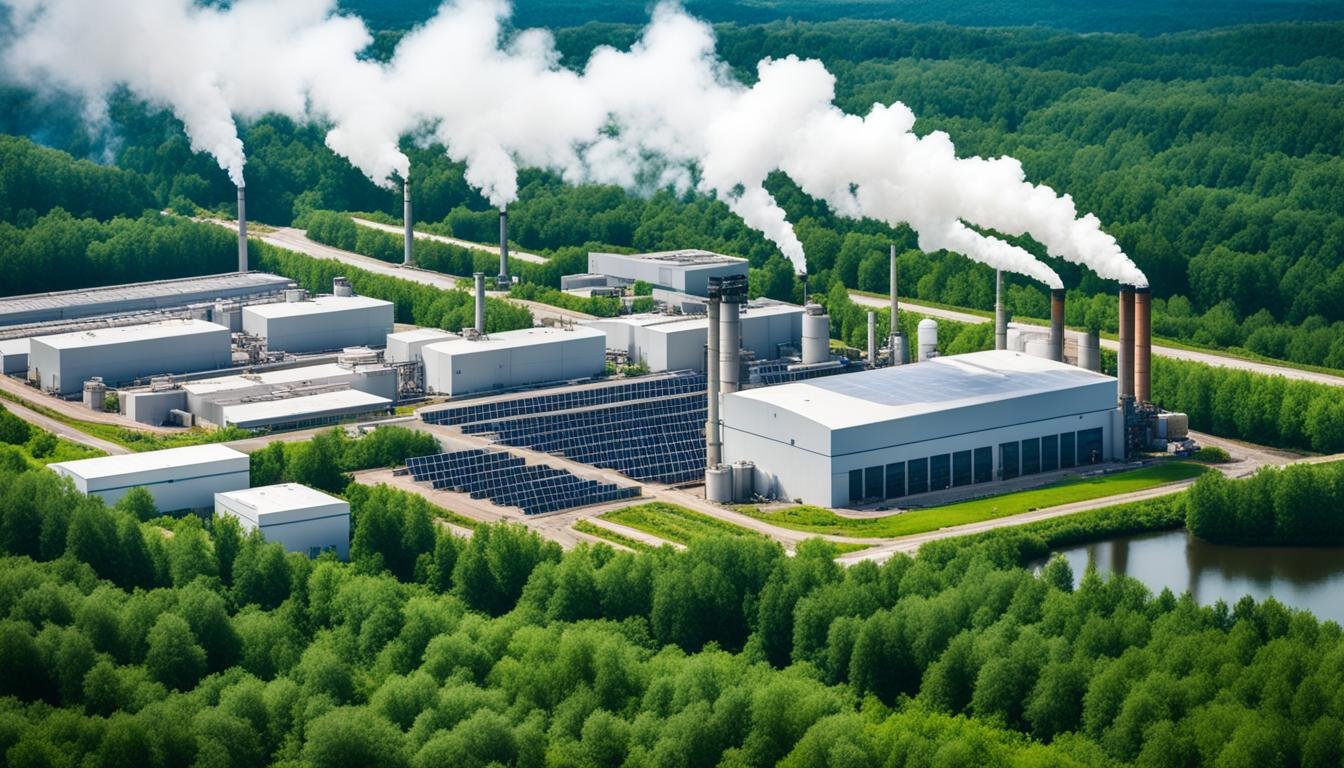Pollution Control Strategies for SMEs
Did you know many small- and medium-sized enterprises (SMEs) create a lot of environmental pollution? Even though they help the economy grow, their actions can harm nature. It’s very important for SMEs to use pollution control methods and go green.
Key Takeaways:
- SMEs are a major contributor to pollution levels and must prioritize pollution control.
- Implementing eco-conscious practices can enhance the reputation and credibility of SMEs.
- Government intervention, such as incentives and regulations, promotes pollution control among SMEs.
- Evolutionary game models help analyze strategies that lead to pollution control and green energy solutions.
- Financial strategies and supply chain financing enable SMEs to overcome financial barriers.
The Importance of Pollution Control for SMEs
SMEs are key players in industry, boosting the economy and creating jobs. Yet, their work can damage the environment. This includes pollution and using up natural resources. It’s essential for SMEs to focus on pollution control and be eco-friendly to lessen their environmental harm.
Keeping things green is crucial for small businesses. It makes sure they follow the laws about the environment. By obeying these rules, SMEs show they care about the planet and being a good part of society. It also helps them look good in the eyes of customers and the public.
“Effective pollution control measures are key for SMEs to minimize their environmental impact and contribute to a greener future.”
By practicing green habits, SMEs can shrink their impact on the environment. They can use less energy, make less waste, and recycle more. Other steps include finding eco-friendly ways to get materials and move products around. These actions help SMEs use resources better, cut down on pollution, and help the planet.
Going green also has good side effects for SMEs. It can save money by using resources wisely and cutting energy use. Plus, it attracts customers who care about the environment. These customers like to support businesses that are green, which can lead to more sales for SMEs.
To show why pollution control is so important for SMEs, look at these numbers:
| Statistics | Impact |
|---|---|
| SMEs account for 99% of all businesses. | Significant number of small businesses contributing to pollution. |
| Environmental non-compliance can result in fines and penalties. | Financial implications for SMEs. |
| Consumers increasingly prefer eco-friendly businesses. | Market advantages for SMEs with sustainable practices. |
By putting pollution control first and going for eco-friendly ways, SMEs can make a big difference. They help make the world cleaner, lessen the load on the environment, and keep the Earth healthy for all of us, both now and in the future.
Government Intervention in Pollution Control
Government action is key in making small and medium-sized businesses control pollution. They set rules and offer rewards to get these businesses to use eco-friendly technology and methods.
These rules push every small and medium enterprise to help the environment. Governments ensure fairness by giving tax breaks, money help, and fines for breaking these rules.
“Government intervention is essential for driving the adoption of green technology and sustainable practices in SMEs. By implementing regulations and providing incentives, governments can effectively steer small businesses towards a greener future.”
Governments help cut down pollution by promoting green tech for small businesses. They encourage these businesses to use green equipment, renewable energy, and better ways to handle waste. This move helps SMEs lessen their harm to the environment.
Also, governments make sure SMEs follow green rules. This means businesses must meet certain eco-friendly standards. It makes them responsible for their waste and pushes them to control pollution.
The Role of Government Intervention:
- Imposing environmental regulations to create a level playing field for SMEs
- Providing tax incentives and subsidies to promote the adoption of green technology
- Enforcing penalties for non-compliance with environmental regulations
- Promoting sustainable practices and waste management systems
- Supporting the development of eco-friendly supply chains
Government rules and rewards are essential for getting SMEs to go green. By being proactive, governments make sure small businesses help keep the environment clean.
Government initiatives for pollution control:
| Government Initiatives | Description |
|---|---|
| Tax Incentives | Government offers tax benefits to SMEs that invest in green technology and sustainable practices. |
| Subsidies | Financial support provided by the government to assist SMEs in adopting eco-friendly technologies. |
| Environmental Audits | Government conducts regular audits to ensure SMEs comply with environmental regulations. |
| Environmental Certification | Government provides certification to SMEs that demonstrate commitment to sustainable practices. |
With government support, SMEs focus on anti-pollution efforts and sustainable actions. This not only helps the planet but also boosts their image and success in the long run.
Evolutionary Game Models for Pollution Control
Evolutionary game models show us how to control pollution in supply chains. Here, small and medium-sized enterprises (SMEs), key businesses, and banks all play a role. They help us see the effect of things like government incentives. And they show us the best ways to get SMEs to use green energy more.
These models could help make supply chains greener long-term. They let experts and leaders check different ideas and see their results over time. By looking at how everyone involved works together, we can improve supply chains to care more about the planet.
They are great for getting everyone in a supply chain to work on pollution together. By focusing on green supply chains, SMEs can start using more green energy and eco-friendly practices. This shift can make the whole supply chain more sustainable.
Evaluating Government Interventions
These models help understand how government policies affect pollution control. Governments can encourage eco-friendly actions through taxes, fines, and rewards. When these are part of the model, we learn how to get everyone moving in the right direction.
Take green supply chains as an example. These models can check if government rewards help SMEs go green. By designing rewards for clean energy well, governments can help the environment and the economy.
The Role of Green Energy Solutions
Green energy is key for SMEs to fight pollution. Evolutionary models let us study how green options are chosen and used in supply chains. They help in picking the options that are good for the planet and make financial sense.
Using renewable energy sources like solar and wind power cuts down harmful gases. This move helps in the battle against climate change and makes the future brighter.
An Illustrative Example
“Our analysis using evolutionary game models showed that giving SMEs incentives for green energy boosted their use of clean power. This move brought down their pollution and saved money in the long term. The teamwork of SMEs, big companies, and banks pushed for more green power, making the whole supply chain greener and sustainable.”
Financial Strategies for Pollution Control in SMEs
Small and medium-sized enterprises (SMEs) need to reduce their environmental impact. They often find it hard to start eco-friendly practices. This is due to financial issues. Special financial plans can help SMEs start these important initiatives.
Green loans are a good way for SMEs to get money for green projects. These loans help with things like managing waste better. They usually have benefits like lower interest and more time to pay back.
Green loans let SMEs tackle waste management projects like setting up recycling. This helps reduce pollution. It shows that SMEs care about the planet.
Trade credit means SMEs can buy things on credit from their suppliers. This helps save money and use it for pollution control. SMEs can ask for payment flexibility or discounts for being eco-friendly. This keeps their business running smoothly while they work on being green.
Financial institutions offer different ways to fund pollution control. This might be through grants, subsidies, or even investing in the business. Working with these institutions helps SMEs get the money they need for eco-projects.
These institutions can also help with advice and knowledge. They offer programs to teach SMEs the best ways to manage waste. This support makes it easier for SMEs to reduce pollution.
Table: Financial Strategies for Pollution Control in SMEs
| Financial Strategy | Description |
|---|---|
| Green Loans | Loans specifically tailored for eco-friendly initiatives, providing favorable terms and conditions for SMEs. |
| Trade Credit Financing | Obtaining goods and services on credit from suppliers, improving cash flow for pollution control. |
| Access to Capital | Partnerships with financial institutions to secure funds for implementing pollution control measures. |
| Guidance and Expertise | Financial institutions providing resources and educational programs for SMEs on sustainable waste management. |
Using the right financial strategies lets SMEs do their part against pollution. The support from financial institutions is key. Together, they can build a sustainable future.
Collaboration and Bargaining in Green Supply Chains
Working together and negotiating are key in making supply chains eco-friendly. When dealing with issues like pollution, companies can work with others. This includes both small and medium-sized businesses and larger partners.
By working together, these different groups combine their strengths. This means more money, know-how, and skills can be used to fight pollution better. This way, everyone gains, and it’s easier to cut costs.
Green deals let smaller businesses get better money deals for green projects. They use their team power to get better loans or subsidies. These financial boosts help in making their efforts to reduce pollution more effective.
“Collaboration and bargaining work hand in hand in achieving effective pollution control strategies within green supply chains. By collaborating, SMEs can pool resources and knowledge while leveraging their bargaining power to negotiate favorable terms for financing.”
Small and medium-sized businesses should look for friends in big companies and banks. This way, they build strong and lasting partnerships. They also work towards making their environments cleaner.
Benefits of Collaboration and Bargaining in Green Supply Chains:
- Access to more expertise and tech than a small business could get alone.
- Save money by sharing and avoiding doing the same things.
- Get better financial deals for green projects by combining your power.
- Build trust by working with like-minded others.
- Learn new ways to fight pollution.
Real-World Examples of Collaboration and Bargaining in Green Supply Chains:
1. Apple leads in making its supply chain green. It works closely with its suppliers on green projects. Together, they aim to use less, waste less, and rely on green energy.
2. The Green Climate Fund partners with banks and others to help small businesses go green. Thanks to this, many small companies can now get green project funds. This makes supply chains more planet-friendly.
3. Patagonia joins hands with its makers for eco-friendly clothes. It makes sure its supply chain meets strict green rules. Thanks to this partnership, Patagonia’s clothes are not just stylish but also Earth-friendly.
Joining forces and negotiating are key in making supply chains cleaner. It’s through this teamwork that small businesses can lead in creating a greener tomorrow.
Technological Innovation for Pollution Control in SMEs
Technological innovation is a key player in controlling pollution in small and medium enterprises (SMEs). It helps these businesses adopt green technology and sustainable practices. This, in turn, reduces their impact on the environment and helps everyone move towards a cleaner future.
One big area where tech makes a difference is using renewable energy. SMEs can use solar, wind, or hydro power to run their businesses. This cuts down on using fossil fuels and lowers harmful emissions. By using energy-saving gear like LED lights and efficient machines, SMEs also lower their energy use and their carbon footprint.
“Technological innovation enables SMEs to achieve cost-effective pollution control and enhance their environmental performance.”
Technology is also crucial in managing waste. SMEs employ high-tech waste systems, including recycling and composting, to reduce landfill waste. Automated systems and smart sensors help keep an eye on waste, making disposal more efficient.
Moreover, using tech for pollution control means SMEs can watch their eco-performance closely. With environmental monitoring and data analytics, they sort out where to improve and can see their progress towards green goals. This analytical approach helps them make decisions backed by facts, fine-tuning pollution control efforts.
Benefits of Technological Innovation for SMEs
Adopting green tech and sustainable methods has many pluses for SMEs:
- It lowers running costs via energy-efficient setups and less waste.
- It makes SMEs stand out as eco-friendly in the market.
- It pleases customers who care about the environment, boosting loyalty.
- It ensures the company follows green laws, avoiding fines.
- It builds a stronger brand and impresses stakeholders.
Case Study: Solar Panels for Energy Generation
ABC Manufacturing recently switched to solar power for its energy needs. This chemical processing firm cut its use of traditional energy and slashed its carbon footprint. Solar panels not only made the energy cleaner but also saved money on bills.
This move improved both their environmental and financial standing. The solar investment brought long-term savings and helped the planet. It’s a great example of how tech can help with pollution control, benefitting the economy and the environment.
| Benefits of Technological Innovation | Case Study Results |
|---|---|
| Reduced operational costs through energy efficiency | Significant reduction in electricity bills |
| Enhanced competitiveness and market positioning | Improved brand reputation and eco-conscious consumer perception |
| Greater customer satisfaction and loyalty | Increase in customer base, particularly among environmentally conscious clients |
| Compliance with environmental regulations | Avoidance of penalties for non-compliance |
| Improved brand reputation and stakeholder perception | Positive public perception and increased investor confidence |
Environmental Compliance and Regulatory Requirements for SMEs
SMEs play a crucial role in reducing pollution and ensuring sustainability. They must follow environmental rules set by governments. This helps them protect nature and control pollution.
These rules aim to keep the environment safe and lower pollution. By keeping up with these laws and taking necessary steps, SMEs can meet their eco-friendly goals. They ensure a clean world for everyone.
Environmental compliance means doing things that lessen how SMEs harm the environment. These include managing waste properly, controlling emissions, checking pollution levels, and updating officials regularly.
SMEs can cut down pollution and their impact by managing waste well. They should recycle, handle harmful waste safely, and use eco-friendly waste methods.
Also, keeping emissions under control is crucial. SMEs have to watch and limit what they release into the air and water. This keeps the environment safe and protects people’s health nearby.
Reporting to authorities is a key part of following environmental rules. SMEs must tell officials about their environmental actions. This shows they are open and responsible, helping governments track pollution efforts.
Meeting these environmental rules is good for SMEs’ image and business trust. It shows they value the planet and want to be green. This can draw in customers, investors, and partners who care about the environment.
In closing, sticking to environmental laws is crucial for SMEs to help the planet. By obeying these rules, they can lessen their ecological footprint and support a sustainable future.
Supply Chain Financing for Pollution Control
Supply chain financing is key for small and medium enterprises (SMEs) to fight pollution. It gives them the money they need to go green. This method lets SMEs improve their environmental practices while staying financially sound. They work with big companies and banks to get the funds for green projects.
Getting this financing means SMEs must meet eco-friendly standards. They have to check their environmental effects and find ways to do better. This process helps them spot pollution risks and plan how to control them.
“Green supply chain finance helps SMEs match their money goals with helping the planet. It boosts their chances for success and supports a cleaner earth.” – [Expert Name], Environmental Consultant
After proving they care about the environment, SMEs can get this help. It lets them buy green tech, handle waste better, and start green projects.
This system also lets SMEs learn from the big players. These companies and banks know a lot about reducing pollution. Working together means SMEs can do better at stopping pollution.
With this type of finance, SMEs get past money problems to do more for the planet. These funds don’t just help the earth. They also make SMEs more likely to succeed in the long run.
Benefits of Supply Chain Financing for Pollution Control:
- Enables SMEs to invest in eco-friendly practices and technologies
- Improves the financial stability and competitiveness of SMEs
- Supports compliance with sustainability standards and environmental regulations
- Facilitates collaboration and knowledge sharing between SMEs, core enterprises, and commercial banks
- Contributes to a greener future by reducing the environmental impact of SMEs
Thanks to supply chain financing, SMEs can do a lot to stop pollution. They can get the money they need to be more eco-friendly and lessen their impact on the planet. This way, they help build a future that cares for the environment.
Risk Management and Insurance for Pollution Control in SMEs
Risk management and insurance are key for SMEs’ pollution control efforts. Small and medium-sized businesses face risks like bad environmental effects and surprise events. It’s crucial they handle and reduce these risks early on. Getting the right insurance can greatly help with the risks of pollution control.
Working with insurance firms that understand environmental risks is a smart move. This helps SMEs be ready for any potential harm or costs from their environmental actions. With the correct insurance, legal and money problems from environmental accidents are easier to handle.
But it’s not just about insurance. SMEs should also have solid risk management plans. This means spotting and measuring risks, making rules and backup plans, and always checking to follow the law.
Combining good risk management and the right insurance can protect SMEs. It keeps their business safe and stable. And it shows they’re serious about the environment, which is good for their image.
“Effective risk management and insurance coverage are crucial for SMEs engaged in pollution control. By proactively addressing potential risks and obtaining appropriate insurance, SMEs can protect their business and contribute to a sustainable future.”
Eco-friendly Practices and Risk Management
Going green can be risky for small and medium-sized companies. The eco-world is full of challenges and unknowns. SMEs must look at and control these risks to stay green and open for business.
Some risks with green practices include:
- Not following regulations
- Accidents that harm the environment
- Trouble with supplies
- More expensive to run their business
To tackle these risks, SMEs need to:
- Check out how their actions might harm the planet
- Set strong rules to prevent accidents
- Make plans to keep the business going if there are issues
- Always check how well their green efforts are doing
Mixing strong risk management and pollution control plans helps SMEs succeed. They’re able to do good for the planet while keeping their business on track.
| Benefits of Risk Management and Insurance for SMEs | Examples of Risk Management Strategies |
|---|---|
| – Limits financial dangers | – Checks on environmental impacts |
| – Solves issues with supplies | – Makes plans for when things go wrong |
| – Builds good reputation and trust | – Always looking at how to do better |
| – Helps follow the law | – Sets strong rules to prevent issues |
Including risk management and the right insurance in their green plans helps SMEs grow to help the planet. They make sure they can keep their business running in a changing, risky environmental world.
Training and Awareness Programs for SMEs
Training and awareness are key for small and medium-sized enterprises (SMEs) to focus on pollution control. They offer education on environmental sustainability, waste management, and pollution control strategies.
Sustainability workshops and training sessions help SMEs learn practical pollution control steps. They provide information on the best practices, new technologies, and current regulations.
“Participating in these programs has transformed our pollution control methods. We optimized our waste management and adopted sustainable practices. This knowledge empowers us to make a difference for a cleaner environment.” – Jennifer Hernandez, CEO of GreenTech Solutions
Training and awareness are essential for SMEs. They provide the tools for implementing sustainable practices and reducing environmental harm. Governments and organizations must also help raise awareness and provide needed resources for SMEs.
The Benefits of Training and Awareness Programs for SMEs
- Training deepens SMEs’ knowledge of pollution control, environmental laws, and sustainable practices. This knowledge helps SMEs make right choices and implement effective pollution control.
- Workshops enhance skills in waste management, energy saving, and use of green tech. These skills help SMEs adopt sustainable practices and reduce their impact.
- Training on regulations ensures SMEs know and follow environmental rules. This knowledge helps SMEs avoid fines and contributes to a cleaner environment.
- These programs also offer networking with peers and experts. This connection promotes sharing ideas for better pollution control.
| Training Programs and Awareness Initiatives | Description |
|---|---|
| Environmental Education Workshops | These workshops aim to educate on environmental issues and how to control pollution. They tackle waste management, energy saving, and using green tech. |
| Sustainability Training Sessions | These sessions focus on practical skills for sustainable business practices. They include water and energy saving, recycling, and managing a sustainable supply chain. |
| Regulatory Compliance Workshops | They cover environmental laws that SMEs must follow. These workshops help SMEs understand their legal duties and how to meet these laws. |
| Industry-Specific Trainings | Trainings are customized for various industries to meet pollution control needs. They aid SMEs in making their practices more eco-friendly. |
For SMEs, engaging in training and awareness is a must for pollution control. Through these programs, SMEs get the knowledge and skills to practice effective pollution control. Thus, they play a big part in building a sustainable future.
Conclusion
Pollution control is vital for small and medium enterprises (SMEs). It helps them be sustainable and lessen their environmental impact. SMEs can help by going green and using sustainable methods.
Working with others is key. This includes the government, banks, and bigger companies. Setting up eco-friendly supply chains and using green technology can make a big difference.
By working together, SMEs can make the future better. They can do this by caring for the environment and planning for the long run. This way, they protect the planet for those who come after them.







